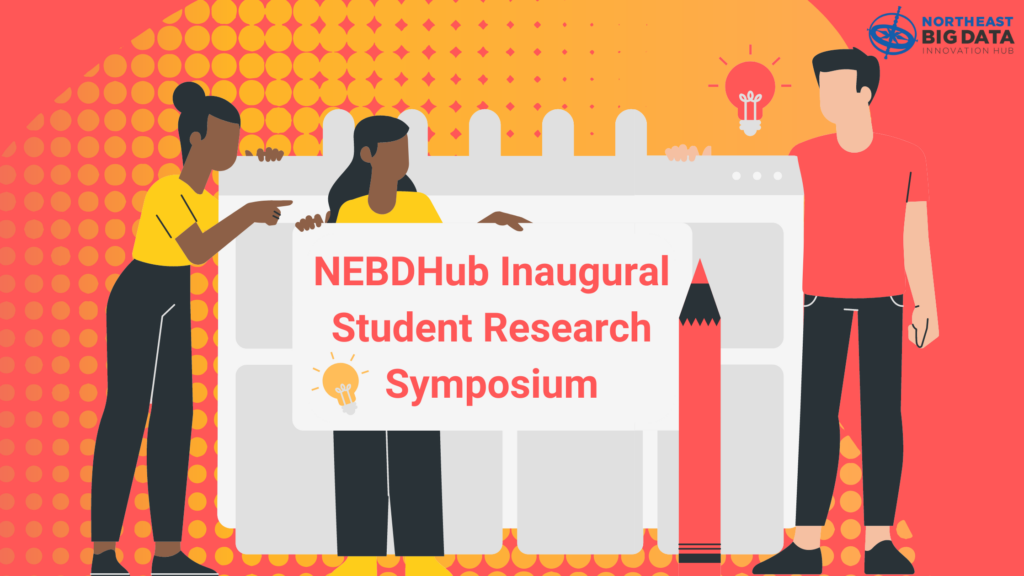
Written by: Femi Johnson
A recording of this event is available at the Northeast Big Data Hub’s YouTube channel.
On January 27, 2023, the Northeast Big Data Innovation Hub (NEBDHub) held its 2023 Inaugural Student Research Symposium. This event highlighted the student-led research that was completed by undergraduate- and graduate-level students from around the world in 2022 through NEBDHub programs. This group included students who participated in the 2022 NSDC Data Science Symposium, the CIC Student Paper Challenge, and the Cybersecurity Risk Conference, funded by the National Science Foundation (NSF). Florence Hudson, NEBDHub Executive Director, Emily Rothenberg, NSDC Program Coordinator, and Stephanie Guo, Columbia University Graduate Student and NEBDHub Student Assistant, introduced twelve students representing nine universities to present their research.
The 2022 NSDC Data Science Symposium (DSS) first place winners, Kiet Nguyen and Zhuldyz Ualikhankyzy from Case Western Reserve University, gave a presentation of their research, titled “Prediction of Russian Ruble (RUB) against United States dollar (USD) in June 2022 amidst the Russian-Ukraine war.” Their study forecasted the currency exchange rate based on oil prices to help organizations make better business decisions. A linear regression machine learning model was deployed, and the results showed that oil price was a significant factor for forecasting the USD/RUB value.
The second place winners of the 2022 NSDC DSS, Vivian Almaraz and Michele Sezgin from Smith College, leveraged a dataset from 2007 to 2021 with an average of 3,000 observations per year to identify mental health and social support needs amongst 8th through 12th graders of Hampshire County schools in Massachusetts. Vivian and Michele’s project, “Visualizing Hampshire County School Health Data,” was designed in collaboration with the Data Science Corps – Wrangle, Analyze, and Visualize (DSC–WAV) team. They created a dashboard that can be leveraged by the Strategic Planning Institute for Families and Youths (SPIFFY) to track changes in student substance usage, and other quantifiable metrics, with a focus on preventing unhealthy behaviors in Hampshire County youth.
Additional presentations showcased the papers written by the 2022 CIC Student Paper Challenge graduate cohort winners, Jinming Wan, Toby Law, and Xin Zan, from Binghamton University, Columbia University, and the University of Florida, respectively.
Jinming’s research provided insights on how “Multilayer Networks with Higher-order Interaction Reveal the Impact of Collective Behavior on Epidemic Dynamics.” His simulated results indicated that a multi-layer network model would provide a more sophisticated framework to study pandemic intervention policies.
Toby Law’s research on the “Association Between Educational Attainment and COVID-19 Vaccine Hesitancy in the United States” incorporated 1.2 million cross-sectional observations of relevant variables, like age, race, and marriage status, into a stepwise multiple logistic regression model and sensitivity analysis. Results from the findings showed that the U.S. education reform policy is a powerful mitigator of vaccine hesitancy. Major factors that were highlighted and associated with vaccine hesitancy included recent job loss and earlier infections of COVID-19.
Xin Zan then presented her research on “Data-driven Adaptive Testing Resource Allocation Strategies for Real-time Monitoring of Infectious Diseases.” She explained the need for a model that can detect disease outbreaks rapidly and accurately. By collecting testing data, and using a physics-informed model to assess infection risk and transmission, Xin proposes a method to monitor and predict disease outbreaks.
Additionally, the undergraduate cohort winners of the 2022 CIC Student Paper Challenge shared their research findings. Evelyn Zhou, an undergraduate student at the University of South Africa, shared her analysis of the “Advances in Machine Learning Explainability to Contextualize Equity Market Sustainability in South Africa During the COVID-19 Era.” Selected pharmaceutical and food retail companies had a positive shift in stock value while others, like tourist and recreational centers, saw a negative shift between January 2017 and September 2022.
Paige Gavin and Sarah Frieman from George Washington University shared their research on “Failed Liminality and Disenfranchised Grief: COVID-19 Deaths in Nursing Homes.” Their research showed that the grief caused by the death of loved ones wasstill being felt globally in 2022 from the COVID-19 pandemic. The conditions of nursing homes and the treatments for COVID-19 patients were collated and displayed during the presentation through the use of podcasts and imagery in order to depict the mental and emotional effects of the pandemic.
Finally, students who participated in the Cybersecurity Risk Conference in 2022, discussed their research on artificial intelligence and machine learning tools to combat cyber threats. Chanel Cheng’s research, “Cross-Organizational Continual Learning of Cyber Threat Models,” supported the development of an intelligent cybersecurity model through a continuous learning process. For the purpose of creating a confident model that can continually adapt to changes over time, a replay buffer was employed to store and replace old samples with fresh data samples.
Serena Yang’s research, “A Data-Driven Approach for Cyber Risk and Threat Assessment,” discussed data-driven analysis that can assist with cyber risk assessments. Comparing data points across various countries and times of day, Serena’s research can assist organizations in estimating when cyber attacks are most likely to occur.
Following the insightful presentations by the student researchers, Stephanie Guo moderated an open Q&A discussion for the student researchers to provide responses to questions from the attendees, and share their experiences and suggestions for current and future researchers in the audience. Emily finally thanked the student researchers, the organizers, and all who contributed to the success of the Student Research Symposium, and closed the event.
______________________________
Stay Connected!
Find more information about the National Student Data Corps on our website
Connect with us and fellow data science enthusiasts by joining the NSDC Slack community
Sign up for the NSDC newsletter
Follow the Hub on Twitter at @nebigdatahub and the Northeast Student Data Corps at @data_corps
Follow the Hub on Instagram and LinkedIn
Become a REAL Volunteer for the NSDC
Start or Join an NSDC Chapter
Email us at contact@nebigdatahub.org with any questions or comments!
